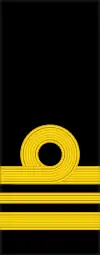Lieutenant-commander (Canada)
In the Royal Canadian Navy, the rank of lieutenant commander (LCdr) (French: capitaine de corvette or capc) is the naval rank equal to major in the army or air force and is the first rank of senior officer. Lieutenant commanders are senior to lieutenants (N) and to army and air force captains, and are junior to commanders and lieutenant colonels.[1]
Following Royal Navy practice, promotion to the rank of lieutenant commander was previously automatic following accumulation of eight years' seniority as a lieutenant(N). That practice changed in the mid-1990s, after which lieutenant commander appointments were limited and subject to competition.
Typical appointments for a lieutenant commander include:
- Commanding officer of a minor warship, submarine or reserve division.
- Executive officer or head of department of a frigate, destroyer, supply ship, reserve division or training establishment.
- Staff officer on a formation or task group headquarters staff.
The rank insignia for a lieutenant commander is two 1⁄2-inch (13 mm) stripes with a 1⁄4-inch (6.4 mm) stripe between, worn on the cuffs of the service dress jacket, and on slip-ons on other uniforms. As senior officers, they wear one row of gold oak leaves along the edge of the visor of their service caps. Lieutenant commanders of the Naval Operations Branch wear the officer's pattern of the branch cap badge: an anchor on a black oval, surrounded by a wreath of maple leaves at the sides and base of the oval, the whole surmounted by the St Edward's Crown. Specialist officers in such branches as Logistics, Intelligence and Medical wear their branch cap badges.
Prior to unification of the Canadian Forces in 1968, rank structure and insignia followed the British pattern. As part of the Canadian Naval Centennial the executive curl pattern (shown only in the dress uniform tunic picture below) of naval officer's rank was returned to all uniforms in 2010.
- Navy uniform variations
 Dress uniform tunic
Dress uniform tunic Uniform shirts (old insignia)
Uniform shirts (old insignia) Shoulder boards for short-sleeve shirt and tropical white tunic (old insignia)
Shoulder boards for short-sleeve shirt and tropical white tunic (old insignia) CADPAT uniform (old insignia)
CADPAT uniform (old insignia)
See also
- Canadian Forces ranks and insignia
References
- "NATO Standard Agreement (STANAG) 2116: NATO Codes for Grades of Military Personnel". NATO standardization agreement. NATO Standardization Agency (published 25 February 2010). 13 March 1996. Archived from the original on 1 September 2011. Retrieved 13 July 2017.